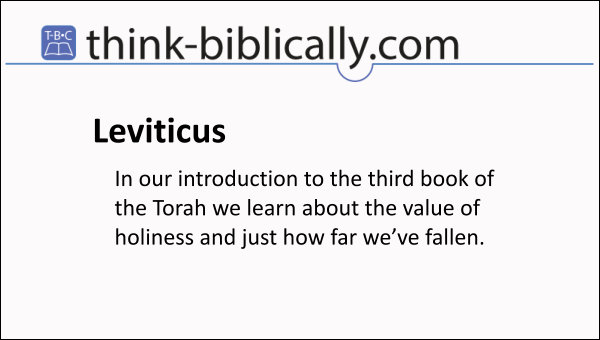By Tyson Thorne

The failures of the people of the great “I AM” were made clear in the book of Exodus; in Leviticus God is all about teaching his people how to move forward. Not literally, of course, since we find Moses and the people still at the foot of the mountain of God. Instead of guiding the fledgling nation out of the desert, God guide them to honor and worship him – both publicly and privately – because corporate and personal obedience to the laws would eventually contribute to the overall health of their nation. God is setting them up for success.
In a sense, Leviticus is both Israel’s Constitution – their duties as a nation – and a personal ethics guide for daily living. While Exodus provided the direction for building the tabernacle, Leviticus now comes along and directs us how to worship and behave in the tabernacle. There are instructions on how to prepare for ceremonies, moral laws, holy days, feasts and even special year-long events like the Sabbath year and the Year of Jubilee. Each of these is purposed to set the people apart, to be holy, to be different from all the nations and people around them. In fact, the word “holy” or “holiness” (meaning “set apart”) is used more frequently in the book of Leviticus than in any other book of the Bible -- including any New Testament book.
The details regarding worship, sacrifice and daily life may seem daunting, but it is a potent reminder of just how far we have fallen from our original nature. God used to walk with Adam and Eve in the Garden of Eden, before the fall, without a second thought. After the fall, due to the sin nature, men and women had to perform a great many sacrifices and purification rituals just be near God in his tabernacle.
While many of these instructions only apply to Israel, there is much in the book that should continue to this day for all of God’s people. Far from a historic curiosity, like the Code of Hammurabi, Leviticus has much to say to the modern reader. It reveals much about God’s character, it provides insights and examples for entering God’s presence in worship and it emphasizes our responsibility to live holy lives. In this last regard, chapter 11 is especially relevant.
Author and Date of Writing
This work was penned by Moses roughly a year after Exodus, putting the date of writing also around 1445. All of the first five books of the Bible were originally known under other titles. Ancient Israelites referred to boos by the first word or two of the book. In this regard, Genesis was known as “In the Beginning”, and Exodus was titled “And These are the Names of”. Leviticus was originally known as “And the Lord Called”. When the books were actually titled is not known, but the titles we have for them today come from the Septuagint, the Greek translation of the Old Testament written between 200 and 300 BC.
The Big Idea
“For I am the Lord your God and you are to sanctify yourselves and be holy because I am holy.” -- Leviticus 11.44